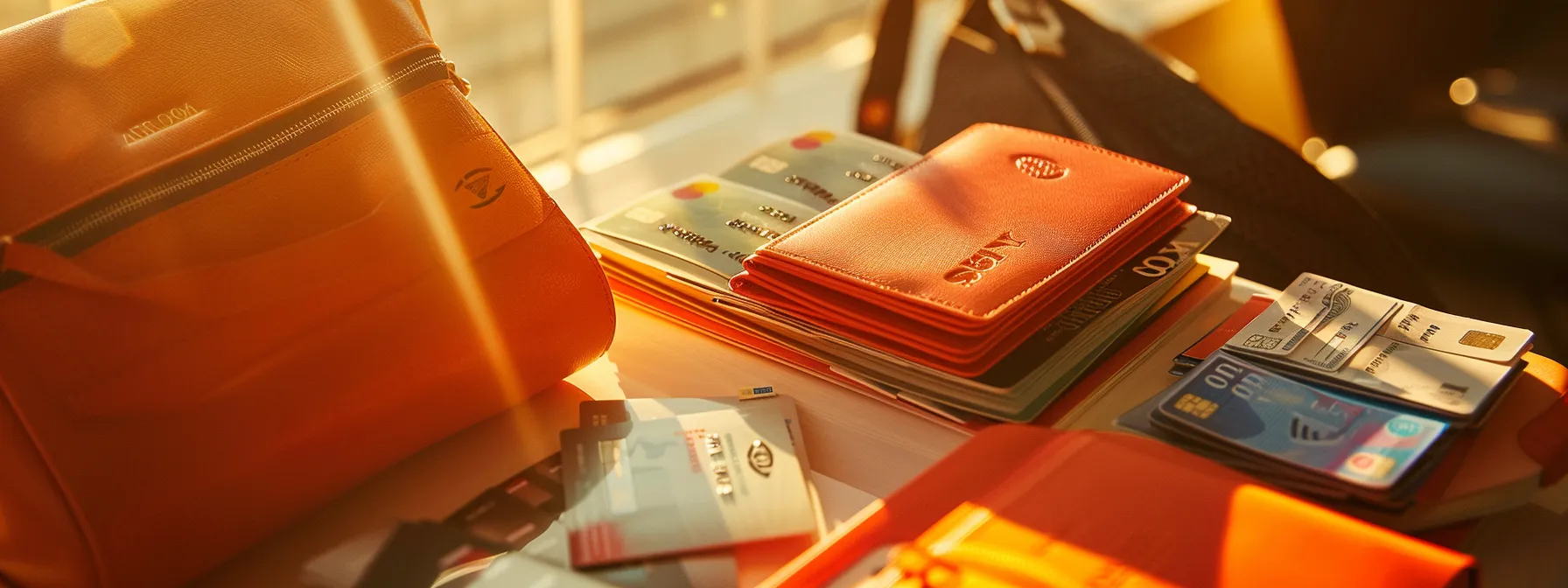When planning a trip, travelers often face the question: Should I use a traveler’s cheque or a credit card? Both options have their pros and cons, especially when considering factors like security from theft, interest rates, and access through ATM cards and debit cards. This article will explore the advantages of traveler’s cheques, compare them to credit cards, and help identify which option suits different travel needs. By understanding these options, readers can make informed decisions that enhance their travel experience, ensuring safer transactions and better value for their money.
Understanding Traveler’s Cheques and Credit Cards

Traveler’s cheques serve as a secure alternative for carrying currency while traveling, providing a backup against loss or theft. They are pre-printed cheques that can be used to purchase goods and services, often needing identification. In contrast, credit cards offer convenience and allow customers to make purchases in local currency without carrying large amounts of cash, though they come with risks like identity theft. The following sections will compare these two options in greater detail to help travelers choose the best fit for their needs.
Defining Traveler’s Cheques and Their Purpose
Traveler’s cheques are a secure medium of exchange designed for those traveling abroad. Issued by financial institutions, these cheques are pre-printed and can be used similarly to cash in various establishments, provided the traveler presents valid identification. One of the significant benefits of traveler’s cheques is their ability to reduce the risk associated with carrying large amounts of cash, as they can be replaced if lost or stolen, although some may charge a fee for this service.
These cheques function as a safeguard, making them particularly useful in locations where card acceptance may be limited. Because they are not tied to a specific bank account, traveler’s cheques provide an added layer of security during trips. While they are often considered a reliable option, travelers should weigh the fees that may apply when purchasing or cashing these cheques against the convenience of credit cards, which might offer lower costs and greater flexibility in everyday transactions.
Exploring the Role of Credit Cards in Travel
Credit cards play a vital role in travel, offering a flexible option for managing expenses without the need for carrying cash. With a credit card, travelers can make purchases in local currency, such as Japanese yen, eliminating the hassle of exchanging money at currency exchange outlets. Many credit card providers offer exceptional customer service, assisting travelers with any issues that may arise while abroad, including lost or stolen cards. When setting up a credit card for travel, ensure that the bank account linked to the card has adequate funds and verify that the bank’s customer service telephone number is accessible in case support is needed during the journey.
Using a credit card can significantly enhance a traveler’s experience due to the convenience and security it provides. Travelers benefit from the ability to easily track their spending through online banking features and receive alerts for any unusual transactions. Furthermore, many credit cards come with additional perks, including travel insurance and rewards programs, which can contribute to a smoother travel experience. Overall, understanding the advantages of credit cards can help travelers make informed choices that align with their financial needs and preferences while navigating their trips.
Traveler’s cheques offer a certain safety that credit cards often lack. Let’s examine the benefits of using traveler’s cheques, where peace of mind meets practicality.
Examining the Benefits of Using Traveler’s Cheques

Traveler’s cheques offer several advantages for those navigating foreign lands. Security features, such as unique serial numbers, protect against fraud, while ease of replacement for lost or stolen cheques provides peace of mind. Acceptance in various countries further enhances their practicality, making travelers feel secure when managing their funds without relying solely on credit options or local currency.
Security Features of Traveler’s Cheques
Traveler’s cheques, such as those offered by Travelex, come equipped with several robust security features designed to protect against fraud and theft. Each cheque has a unique serial number, which aids in tracking and validating the cheque in the event of loss. Additionally, if a traveller’s cheque is lost or stolen, the issuing institution can provide a replacement, ensuring that travellers do not face the full financial impact of the loss.
These security measures make traveller’s cheques an appealing option for those concerned about the risks associated with carrying cash or using credit cards. The identification requirements further add a layer of security, as travellers must present valid ID when cashing or using the cheques. Overall, these features can contribute to a greater peace of mind for individuals navigating unfamiliar environments, knowing their funds are safeguarded against potential dangers.
Ease of Replacement for Lost or Stolen Cheques
Replacing lost or stolen traveler’s cheques is a straightforward process that provides significant reassurance for travelers. Once reported to the issuing financial institution, they can be promptly replaced, minimizing the financial impact of such an unfortunate event. This capability is particularly beneficial for those traveling in unfamiliar areas, as having access to replacement funds can alleviate stress and allow travelers to continue enjoying their trip without significant disruption.
Travelers need to retain the purchase receipt of their cheques, as this often simplifies the replacement process. With valid identification, individuals can quickly obtain new cheques, maintaining their financial security while abroad. In contrast, the process for recovering lost or stolen credit cards can be more complicated, sometimes involving delays and challenges, making traveler’s cheques a reliable option for secure currency management during international travel.
Acceptance in Various Countries
Traveler’s cheques are widely accepted in many countries around the world, providing a reliable form of currency for international travelers. While some businesses may prefer cash or credit cards, traveler’s cheques can often be used at hotels, restaurants, and retail establishments, especially in popular tourist areas. This universal acceptance makes them a convenient choice for those venturing into locations with less robust credit card infrastructure.
In regions where credit card use may be limited, such as rural areas or smaller towns, traveler’s cheques can serve as an essential financial tool. They eliminate the anxiety that comes with relying solely on local currency or the potential unavailability of credit card facilities. This enables travelers to navigate unfamiliar places with confidence, knowing they have a secure and accepted payment method at their disposal.
While traveler’s cheques provide security and peace of mind, they are not the only option for those on the move. Credit cards offer their own set of advantages, making them a vital tool for modern travelers seeking convenience and flexibility.
Analyzing the Advantages of Credit Cards for Travelers

Credit cards offer numerous benefits for travelers, such as reward programs and cash back that enhance the overall travel experience. Their convenience and accessibility in various destinations make them a preferred choice, alongside features like fraud protection and travel insurance that provide added security. With these advantages, understanding how credit cards can effectively meet travel needs becomes essential for making informed decisions.
Benefits of Reward Programs and Cash Back
Credit cards often come with reward programs that provide valuable benefits for travelers, turning everyday purchases into travel perks. Many credit card issuers offer points or miles for each dollar spent, which can be redeemed for flights, hotel stays, or even car rentals. For instance, a business owner traveling for work may accumulate points on expenses charged to their credit card, which can significantly reduce future travel costs.
Cash back options also enhance the appeal of credit cards, allowing users to earn a percentage of their spending back as a rebate. This can be particularly useful for travelers who make significant purchases, such as booking flights or accommodations. By using a credit card with cash back rewards, a traveler can effectively reduce their overall expenses, making it easier to fund additional experiences during their trips. These financial incentives make credit cards a compelling choice when compared to traveler’s cheques, which offer no such rewards.
Convenience and Accessibility in Different Destinations
Credit cards provide travelers with exceptional convenience and accessibility in a variety of destinations across the globe. With the ability to make purchases in local currency, travelers can easily manage expenses without the hassle of exchanging cash. This feature becomes particularly valuable in regions where currency exchange services may be limited or unreliable, enabling a seamless transaction experience while shopping or dining out.
Furthermore, credit cards are widely accepted at numerous establishments, including hotels, restaurants, and attractions, particularly in urban and tourist-heavy locations. This widespread acceptance eliminates concerns about finding places that accept traveler’s cheques or cash, ensuring that travelers can access their funds wherever they go. By providing a straightforward payment process, credit cards help reduce stress and enhance the overall travel experience, allowing individuals to focus on enjoying their journey.
Features Such as Fraud Protection and Travel Insurance
Credit cards often come equipped with fraud protection features that help safeguard travelers against unauthorized transactions. Most credit card companies provide zero liability policies, meaning that if a card is lost or stolen, the user is not held accountable for any fraudulent purchases made after reporting the loss. This level of security is especially important for travelers who may face heightened risks while moving through unfamiliar environments.
Moreover, many credit cards offer travel insurance benefits that can cover unexpected events, such as flight cancellations or lost luggage. This type of insurance provides peace of mind, ensuring that travelers do not incur significant financial burdens due to unforeseen circumstances during their journeys. By utilizing a credit card with these protective features, travelers can confidently focus on enjoying their experience, knowing they have a financial safety net in case of emergencies.
Credit cards can make travel easier, but they come at a price. Let’s take a closer look at how traveler’s cheques stack up against them in cost and convenience.
Comparing the Costs of Traveler’s Cheques and Credit Cards

The costs associated with travel currency management hinge on several factors. Fees linked to purchasing and cashing traveler’s cheques can vary, potentially impacting overall expenses. In contrast, credit cards may incur interest rates and transaction fees that travelers should consider. Currency conversion rates also play a crucial role, influencing how much travelers ultimately pay for goods and services abroad. Each of these elements will be explored in detail to provide clearer insights into making an informed choice.
Fees Associated With Purchasing and Cashing Cheques
The costs associated with purchasing and cashing traveler’s cheques can vary significantly, impacting travelers‘ budgets. Many financial institutions charge fees when travelers buy these cheques, which can diminish their perceived value. Additionally, when cashing traveler’s cheques, some establishments or banks may impose transaction fees, especially if they are outside the issuing country. Travelers should evaluate these costs carefully to determine if the benefits of using traveler’s cheques outweigh the associated fees.
In contrast, credit cards typically incur interest rates and potential transaction fees, depending on the cardholder’s agreement with their financial institution. While credit cards may offer convenience, travelers need to be mindful of foreign transaction fees, which can add up during international trips. Understanding the full spectrum of costs for both options helps travelers make informed decisions that align their financial capabilities with their travel needs.
Interest Rates and Transaction Fees on Credit Cards
Credit cards can carry varying interest rates, which significantly impact the overall costs for travelers who carry a balance. When making purchases abroad, travelers need to consider that foreign transaction fees may also be applied, often ranging from 1% to 3% of the purchase amount. These fees can accumulate quickly, especially for larger expenses such as hotel bills or tour bookings, making it essential for travelers to choose a credit card with minimal fees and a reasonable interest rate to avoid unnecessary expenditures.
For those utilizing credit cards for travel, it is wise to pay attention to the terms associated with their card agreements. Some cards offer promotional rates for new users or rewards that offset potential transaction fees with benefits like cash back or travel points. Travelers should also familiarize themselves with the specifics of their card’s policy regarding cash withdrawals, as additional fees may be assessed when withdrawing cash abroad, further affecting the total cost of using credit cards during their journey.
Currency Conversion Rates and Their Implications
Currency conversion rates significantly influence the overall costs associated with using travel funds. When travelers exchange cash or use traveler’s cheques, the rates offered may not align with market rates, resulting in higher expenses. Financial institutions typically charge a markup on these rates, which can diminish the value of the funds available for spending during a trip.
Conversely, credit cards often offer more favorable currency conversion rates, especially with those that do not impose foreign transaction fees. This advantage allows travelers to manage expenses more efficiently while making purchases in local currency. Understanding these rates can aid travelers in choosing the most cost-effective method of handling funds abroad, ensuring more savings to be allocated toward enriching their travel experiences.
Now that the costs are laid bare, the choice between traveler’s cheques and credit cards looms large. Understanding when to use each can mean the difference between a smooth journey and unnecessary hassle.
Identifying When to Choose Traveler’s Cheques or Credit Cards

Travelers can benefit from understanding specific situations where either traveler’s cheques or credit cards may be more advantageous. Traveler’s cheques excel in regions with limited card acceptance, providing a secure alternative when cash is not ideal. Conversely, credit cards often shine in urban areas, offering convenience and rewards. Evaluating personal preferences and travel styles can significantly influence this choice, ensuring travelers select the most suitable option for their journey.
Situations Favoring Traveler’s Cheques
Traveler’s cheques are particularly advantageous in regions where credit card acceptance is inconsistent or limited. For example, in remote areas or small towns, businesses may not accept credit cards, making traveler’s cheques a reliable alternative. Their wide acceptance at hotels and tourist-focused establishments provides travelers with peace of mind, knowing they can access funds without relying solely on local currency or cash.
Additionally, using traveler’s cheques can enhance security for those concerned about identity theft during their travels. Since these cheques require identification for cashing, they offer an extra layer of protection against loss or theft. For travelers prioritizing safety and the ability to manage their finances while exploring unfamiliar places, traveler’s cheques present a practical solution to ensure smooth financial transactions.
Scenarios Where Credit Cards Shine
Credit cards excel in bustling urban areas and popular tourist destinations where acceptance is widespread. Travelers appreciate the ease of making purchases without the need to carry large amounts of cash. For instance, when dining at a five-star restaurant or booking accommodations on the go, using a credit card allows for a quick, seamless transaction while traveling. This convenience not only enhances the experience but also reduces the risk associated with carrying physical cash or traveler’s cheques.
Additionally, credit cards often come with various rewards programs that can benefit frequent travelers. By utilizing points or cash back on transactions, travelers can offset some of their travel expenses, freeing up funds for other activities. This financial incentive makes credit cards a compelling option amid a range of travel-related costs, allowing business owners and leisure travelers alike to manage expenses more efficiently while enjoying their journeys.
Evaluating Personal Preferences and Travel Styles
When evaluating personal preferences and travel styles, individuals should consider their comfort level with different payment methods. For those who prefer traditional forms of currency management or are traveling to regions with limited credit card acceptance, traveler’s cheques can provide a sense of security. On the other hand, travelers who prioritize convenience and readily available funds might find credit cards better suited to their needs, especially in urban or tourist-heavy areas where card usage is prevalent.
Additionally, travel styles vary significantly among individuals; some may embrace spontaneous adventures and require instant access to funds, making credit cards more appealing. For travelers who plan meticulously and prefer having a budget, traveler’s cheques offer a way to control spending while minimizing risks associated with carrying cash. Ultimately, assessing these personal preferences can guide travelers in deciding which option aligns best with their journey and overall financial strategy.
Many believe that traveler’s cheques are outdated, while others stand by the security of credit cards. Let’s uncover the truths and myths surrounding these travel essentials to make an informed choice.
Reviewing Popular Myths About Traveler’s Cheques and Credit Cards

Common misconceptions about traveler’s cheques and credit cards can lead to confusion regarding security and acceptance abroad. Many believe that traveler’s cheques are inherently safer, while others underestimate their acceptance rates in various countries. Additionally, both options have associated fees and costs that can be misunderstood. This section will clarify these myths, offering practical insights into the realities of using traveler’s cheques and credit cards while traveling.
Misconceptions Surrounding Security and Safety
Many travelers mistakenly believe that traveler’s cheques offer superior safety compared to credit cards. While traveler’s cheques are designed to be a secure form of currency, the reality is that they require identification for cashing and can still be susceptible to fraud. On the other hand, credit cards come equipped with advanced fraud protection features, significantly reducing the risk of financial loss if cards are lost or stolen.
Another common misconception is that credit cards are not widely accepted abroad, leading some travelers to rely solely on traveler’s cheques. In fact, credit cards are accepted at most establishments in urban areas and popular tourist destinations, making them a convenient option for managing expenses. Understanding the acceptance rates and security features of both options can help travelers make more informed decisions that prioritize both convenience and safety during their journeys.
Common Misunderstandings About Acceptance Abroad
Many travelers harbor the misconception that traveler’s cheques are universally accepted in all regions abroad, believing them to be a safer form of currency management. While these cheques hold value in various countries, especially in tourist areas, their acceptance can diminish in less populated or rural settings where businesses prioritize cash or credit card transactions. Travelers should verify acceptance policies ahead of time to avoid complications on their journeys.
Conversely, some individuals underestimate the widespread acceptance of credit cards internationally, often opting for traveler’s cheques as a primary payment method. In reality, credit cards are commonly accepted in urban centers and major tourist attractions across the globe. By leveraging credit cards, travelers can simplify transactions and reduce the need for carrying large sums of cash, allowing for a more convenient travel experience.
Debunking Myths Regarding Fees and Costs
Many travelers believe that using traveler’s cheques always incurs higher costs compared to credit cards, but this isn’t necessarily true. While it’s important to consider the potential purchase fees and charges for cashing these cheques, numerous credit cards also impose foreign transaction fees that can add up quickly. Travelers should carefully compare the cost structures associated with each payment option to make a more cost-effective choice.
Another common misconception is that traveler’s cheques carry no additional fees, leading some to perceive them as a straightforward option. However, financial institutions may assess fees when travelers buy or cash cheques, which can impact their overall value. Understanding the potential expenses associated with both traveler’s cheques and credit cards allows travelers to avoid surprises and select the method that best suits their financial needs while abroad.
Choosing the right payment method can shape your entire journey. Let’s look at how to make the best choice for your next adventure.
Making an Informed Decision for Your Next Trip

When evaluating the options between traveler’s cheques and credit cards, travelers should assess their specific needs and destinations. Creating a balanced payment strategy can enhance financial security, ensuring funds are accessible when needed. Additionally, gathering advice from experienced travelers can provide valuable insights, helping to navigate both payment methods effectively during their journey.
Assessing Your Travel Needs and Destinations
When planning a trip, it is essential to assess specific travel needs and destinations, as these factors influence whether to rely on traveler’s cheques or credit cards. For example, travelers heading to urban areas with a strong credit card infrastructure will likely find credit cards a more convenient option for managing expenses. Conversely, those venturing into rural locations with limited card acceptance may benefit from the security and acceptance of traveler’s cheques.
Understanding the nature of the trip and potential expenses can guide travelers in selecting the best payment method. Business trips may demand quick transactions and the rewards associated with credit cards, while leisure travelers exploring remote areas may prioritize the safety and accessibility of traveler’s cheques. By evaluating these aspects, individuals can make informed decisions that align with their financial strategies while ensuring a smooth travel experience.
Creating a Balanced Payment Strategy
Creating a balanced payment strategy involves assessing both traveler’s cheques and credit cards to determine the most suitable mix for a particular trip. For example, travelers visiting urban areas may find credit cards convenient for everyday purchases, while keeping a small number of traveler’s cheques on hand as a backup can enhance security in case of emergency situations. This strategy not only provides flexibility in transactions but also mitigates the risks associated with carrying a single form of payment.
It is advisable for travelers to take into account their destination, personal comfort levels, and potential expenses when formulating this payment approach. For instance, those heading to countries with limited credit card acceptance might prioritize traveler’s cheques to ensure they have reliable access to funds. By strategically utilizing both payment options, travelers can achieve financial security and peace of mind, knowing they are prepared for various circumstances during their journey.
Getting Advice From Experienced Travelers
Experienced travelers often share valuable insights regarding the use of traveler’s cheques and credit cards, emphasizing the importance of understanding one’s travel environment. Those who frequently explore remote areas recommend carrying a combination of both payment options. This strategy enables travelers to ensure they have secure access to funds, even in regions where credit card acceptance may be limited, thus enhancing their overall travel experience.
Moreover, seasoned travelers frequently advise keeping abreast of potential fees and acceptance rates associated with both methods. They suggest discussing their experiences with peers and utilizing online travel forums to gather information about which payment options have worked best for others in similar situations. This collective knowledge not only aids in making informed decisions but also helps mitigate common issues encountered while traveling, ensuring a smoother journey.

